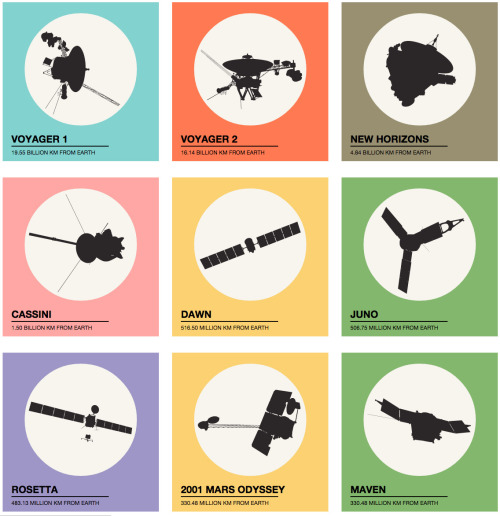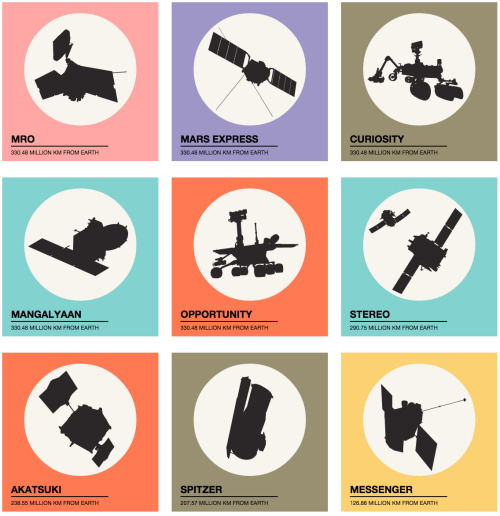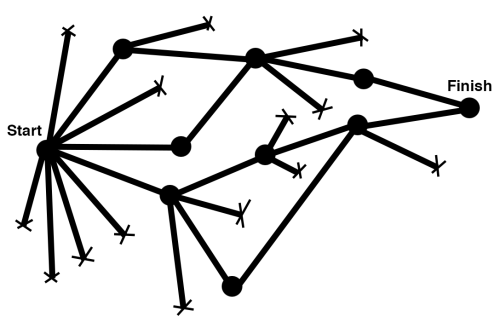Spaceprob.es
¶ by not another Rob?Well this is a pretty goddamned epic website.


Via nevver: Spaceprob.es
Well this is a pretty goddamned epic website.


Via nevver: Spaceprob.es
If you followed PPK’s AngularJS post from January (and his follow-up client-side templating post), then Brett Slatkin’s “Experimentally verified” post is a worthwhile reply in its own right — and somehow I missed it when it originally ran.
Whereas PPK argues largely from a position of principle, Slatkin throws experiments and data at it, and while he arrives at different conclusions, he’s also gracious about the whole thing, drawing the conclusion thusly:
The take-away here is to choose the right architecture for your problem.
What’s good about this post is that he dug deep into this problem, cut it up a bunch of different ways, and remained open to the possibility that either approach might “win”. Which isn’t to say that his experiments were perfect (if some flaws aren’t obvious to you then check out the comment thread where several “improvements” are enumerated) or that there isn’t some speculation going on, but we have some good applied science here to give us a sensible picture.
Two important things here though:
First, it’s hard not to read Slatkin’s post as a refutation of PPK’s. This is unfortunate because, dogmatic though his tone may be, PPK offers up plenty of good points that you should consider when making these choices for your application. Whether you like AngularJS or not, whether you think client-side templates are a good fit for your problem or not, these thoughts are at least worth mulling over.
Which leads to my second point: it’s my sincere hope that people go with Slatkin’s real take-away, and that development teams have the discipline to look at their application, to analyze the data it’s producing about their audience etc., and to think about their goals for the future — and to design and build their applications with those data in mind. It’s entirely too easy to cargo cult decisions from posts like this one (and/or from PPK’s) and just assume that you got it right because you read something compelling from someone smart. By all means take their data into consideration, but no one else’s data is meaningful to you.
WebStorm and Compass
the bloodiest “X-Files”
late summer flowers
“Search Term Haiku” is a series wherein I examine this site’s log files and construct one or more haiku poems from search terms and phrases that led visitors to the site. Where possible, I attempt to keep the search phrases intact. However, as these are haiku poems, I do need to follow the rules.
My first reaction to the Aurelia announcement is (of course) that this is why a lot of developers look at JavaScript and the web front-end and see only thrash, and feel only fatigue. And in this case in particular (given Eisenberg’s previous project involvements), it smells a bit of icarian hubris. 1
And in that respect, you won’t find me among the early-adopters. (Taking a page from “sometimes better isn’t better if it’s different” here.)
That being said, this isn’t to suggest that there is nothing interesting happening in the Aurelia project. Count me with Tom Dale (here, and a couple of the tweets that immediately follow): 2
Still digesting the Aurelia announcement, but the adaptive databinding engine approach is such a no-brainer in retrospect.
— Tom Dale (@tomdale) January 27, 2015
The pluggable data-binding seems like a huge takeaway here and that we are going to see that in every framework, that you can’t have a compelling inter-op story without that. But much of the rest of what’s being pitched here (e.g., modularized code, no external dependencies, “just vanilla JavaScript”) – that’s all stuff that we’ve heard before.
I’ll stay tuned, and I’ll be watching Aurelia, but I’m mostly interested in how it will affect the roadmaps for other projects. Because frankly I’m sick to death of having being told I need to go learn this Completely New Framework/Paradigm/Whatever 3 every six weeks.
Oldie but goodie by Nelson Elhage at the “Made of Bugs” blog: Lab Notebooking for the Software Engineer. I mostly agree with his points, and consistently break the rule about only keeping a chronological journal, as opposed to trying to bucket them under application-specific or domain-specific journals. (That’s a flavor of Premature Optimization and don’t try to let anyone tell you otherwise. [And right here you can expect me to insert all of the exceptions to that rule that I’ve cooked up over the years.])
One thing that should go without saying, and is a bit of advice I’ve given over and over again that dovetails well with Elhage’s post here: feel free to slack off on your “lab notebook” at any time, but the moment that you feel yourself getting scattered, go right back to a disciplined notebook. Nothing makes you slow down and focus on The Right Things quite like keeping a record – no matter how informal that record it.
Ivy Pochoda, “What the Rabbits Taught Us” (in NYTimes Blogs):
The rabbits are small, helpless and stunned. One has floppy ears. As we spend an hour watching them hop and hide, I realize that I’ve never really looked at a rabbit before. They – or at least ours – aren’t quite as elegant as the ones in picture books. They are goofy, with little disapproving mouths. Their back legs look as if they are wearing pantaloons or old-fashioned britches. Although they make me laugh, before I go to bed I swear that I will make sure that they leave tomorrow.
Julie Zhou, Junior Designers vs. Senior Designers:

“There’s method in the madness.”
Whole thing is great.
Jon Dobrowolski, A framework for modern User Stories
My inner Scrum Master got a little bit excited about this.
What I liked about it is the attention it gives to the language of a User Story – right down to the specific words that are used to make the statements. Granted, the other thing that I liked about this piece was how it both embraces the traditional User Story format, while updating/expanding it a bit to allow for more information to get “built in”.
You could argue that what’s added should have been encompassed by Acceptance Criteria anyway, but using BDD statements here seems more constructive. (…because they easily convert into acceptance tests.)
Peter Bell, Innovation debt:
Just as technical debt can kill a code base by turning a green field project into a big ball of mud, innovation debt can kill an engineering team – moving them from a cutting edge crew to a group that’s barely competent to maintain a legacy app.
There’s the argument that “innovation debt” is just another form of technical debt – that the latter isn’t just the tests you didn’t right, but the opportunity costs of not exploring alternatives.
What I like about this post is that, assuming you take a measured approach here, you can use a combination of these techniques to keep engineers interested and happy. You can give people the room to explore some new technologies and maybe, if those technologies actually are good choices, then by all means bring them into the stack.
That being said, it’s almost too easy to read Bell’s post and use it as a justification for your own Magpie Syndrome. A “culture of learning” is great – but recognize that your exploration can also lead to another, equally valuable bit of knowledge – the knowledge that after exploring some new piece of technology, that it’s actually not a good idea to move forward with it. Trying new things is fine – and you should explore alternatives – but sometimes your innovation is “add Java 8 streams” and not “rewrite everything in Scala”.
I also feel like it’s worth calling out (for the tech leads in the audience) that not everyone wants to do shiny new stuff all the time. (See also: Matt Asay’s thing re: “developers calling it quits on polyglot programming”.) “Innovation debt” as Bell describes it sounds like it goes a couple ways: the “explore innovative shiny new things” way, and the “double-down on what you have and make sure your engineers know their shit” way. Ignore both at your peril.
Homebrew #4 was also as “The Misled Brewing Co-op” (thus with my friend Adam) and we brewed up Antithesis, a saison du vin: 1